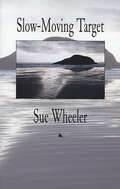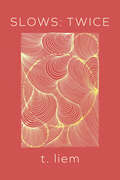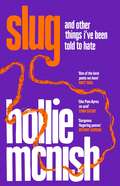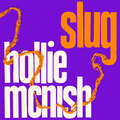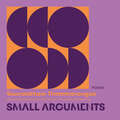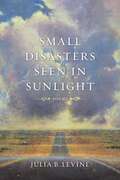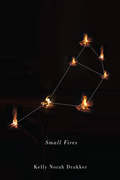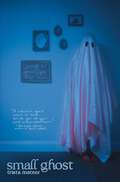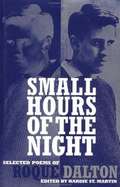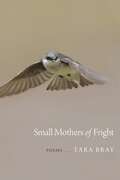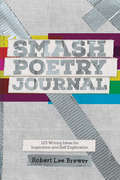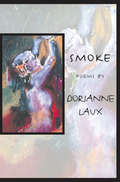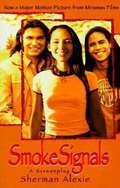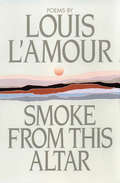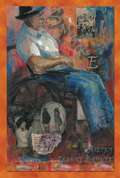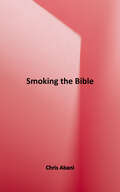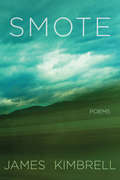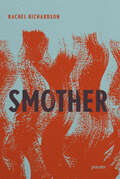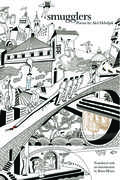- Table View
- List View
Slow-Moving Target
by Sue WheelerShortlisted for the 2001 Pat Lowther Award and the 2001 Dorothy Livesay Award for Poetry (BC Book Prizes) In her second book, Slow-Moving Target, Sue Wheeler unwraps more than the Fifties. She unwraps a whole shopful of environments and events, and winds them up and sets them down to delight her readers. There is no sentimentalizing here -- either of people or of other places and times -- and yet the writing is so consistently sharp, perceptive, and clear, that the overall direction is always towards hope, towards the light.
Slows: Twice
by T. LiemCBC BOOKS CANADIAN POETRY COLLECTIONS TO WATCH FOR IN SPRING 2023Backward and forward: a double book of mirrored poems about identity in all its forms.This is a book of slow hours, days, and years—how they can collapse into one another, how it can feel like we are living one day repeating itself. From within this collapse, the speaker seeks connection everywhere. They visit their father’s birthplace, Jogjakarta; they listen to a stranger’s phone call at the Motel 6 in Alberta; they linger in the so-called ethnic aisle of the grocery store. From all of these places the speaker is discouraged but tries to imagine a future joyously incomprehensible to the present.Slows: Twice is a collection of revisions and repetitions. Every poem in one half of the book has an alternate version, or a mirror poem, in the other half. Lines, words, images, and forms are reused and reflected in a kind of palindrome, so the book can be read from front cover to back cover, or vice versa. In this way, Liem considers how language shapes identity over time and how the speaker’s position in relation to language might be revised. The poems are tied to themes of work and labor, consumption and waste, family and home, as other shapers of identity and relationships. The act of revising and repeating – slowly – is meant to be a resistance to efficiency, a resistance to being an always-productive body under capitalism."The poems of Slows: Twice collect in resonance, contemplate the construction of selves, with modes of repetition, sequencing, and mirroring, the way language assembles an identity or points to itself as it points away. 'The clouds // disappear the sky sometimes; or they become it.' Storied and cubistic, palindromic and cleaved, Liem’s poems reveal relationships to time, noise, and duration, and the possibility of joy given painful pasts." – Hoa Nguyen, author of A Thousand Times You Lose Your Treasure"T. Liem is one of my favorite poets working in Canada. I welcomed this book into my life like sudden sunlight. Slows: Twice is a book about how urgently we need to read differently. I loved its mischievous relation to form and expectation as well as its burning intelligence. I once described T. as an inheritor of the tradition of language poetry, but what Slows: Twice proves is that T. is less an inheritor and more so an innovator, an inventor in their own right. I read it in one frenzied sitting." – Billy-Ray Belcourt, author of A Minor Chorus"It’s breathtaking to watch words drip from a page into a silver river cutting through a canyon of time. T. Liem sculpts poetry with steady, curious fingers, pushing against the filaments we think hold us together that have been quietly collecting cracks, from buried violence and whispered histories to the fragile connections tying us together. Obits. captured my heart; Slows: Twice now affirms it." – Teta, founder of diasporic Indonesian publication Buah zine"'For everything I was, I am now something else.' Revision of self and world are core to this innovative, unruly book that manages somehow to be at once formally wacky and emotionally clear. These poems seem to ask: if language is a box heavy with histories and inadequacies and which we nevertheless must carry, can language also carry us somewhere, elsewhere, strangely? Rarely have I encountered a book so at home in the unresolved, in the tension between a longing for declaration and a commitment to questions. T. Liem’s work conjures the figure of Janus: god of duality and gates, one face facing an end, the other looking through a new door, right in the eye of a dream." – Chen Chen, author of Your Emergency Contact Has Experienced an Emergency<span data-sheets-value="{"1":2,"2":"\"t. liem's SLOWS: TWICE is a fascinating exercise in re
Slug: The Sunday Times Bestseller
by Hollie McNishTHE SUNDAY TIMES BESTSELLER'An intoxicating mixture of poetry and prose, Slug is a taboo-busting delight' SCOTSMAN 'One of the best poets we have' MATT HAIG 'She writes with honesty, conviction, humour and love' KAE TEMPESTThe new collection of poetry and prose from the Ted Hughes Award-winning author of Nobody Told MeFrom Finnish saunas and soppy otters to grief, grandparents and Kellogg's anti-masturbation pants, Slug is a book which holds a mirror lovingly up to the world, past and present, through Hollie's driving, funny, hopeful poetry and prose. Slug is about the human condition: of birth and death and how we manage the possibilities in between.'The inimitable words of poet/goddess Hollie McNish once again hold up honest, damn funny and refreshing takes on the everydayness of our lives . . . Never have we needed her more' STYLIST'Hollie always articulates exactly how I feel' CHARLY COX'A tribute to life itself' RED
Slug: The Sunday Times Bestseller
by Hollie McNishTHE SUNDAY TIMES BESTSELLER'An intoxicating mixture of poetry and prose, Slug is a taboo-busting delight' SCOTSMAN 'One of the best poets we have' MATT HAIG 'She writes with honesty, conviction, humour and love' KAE TEMPESTThe new collection of poetry and prose from the Ted Hughes Award-winning author of Nobody Told MeFrom Finnish saunas and soppy otters to grief, grandparents and Kellogg's anti-masturbation pants, Slug is a book which holds a mirror lovingly up to the world, past and present, through Hollie's driving, funny, hopeful poetry and prose. Slug is about the human condition: of birth and death and how we manage the possibilities in between.'The inimitable words of poet/goddess Hollie McNish once again hold up honest, damn funny and refreshing takes on the everydayness of our lives . . . Never have we needed her more' STYLIST'Hollie always articulates exactly how I feel' CHARLY COX'A tribute to life itself' RED
Slug: The Sunday Times Bestseller
by Hollie McNishListen to the audiobook for an exclusive interview with Hollie and her good friend, radio presenter Gemma Cairney. Hollie has also included a special poetry reading in memory of her grandmother, as well as an exclusive preview of poems from her next book.'One of the best poets we have' MATT HAIG'She writes with honesty, conviction, humour and love' KAE TEMPEST 'Hollie always articulates exactly how I feel' CHARLY COX The new collection of poetry and prose from the Ted Hughes Award-winning author of Nobody Told MeFrom Finnish saunas and soppy otters to grief, grandparents and Kellogg's anti-masturbation pants, Slug is a book which holds a mirror lovingly up to the world, past and present, through Hollie's driving, funny, hopeful poetry and prose. Slug is about the human condition: of birth and death and how we manage the possibilities in between.'The inimitable words of poet/goddess Hollie McNish once again hold up honest, damn funny and refreshing takes on the everydayness of our lives . . . Never have we needed her more' STYLIST
Small Arguments: Poems
by Souvankham ThammavongsaA beautiful re-issued edition of poetry from the Scotiabank Giller Prize–winning author of How To Pronounce Knife FEATURING A NEW INTRODUCTION BY THE AUTHORThe language of Small Arguments is simple, yet there is nothing simple in its ideas. Reminiscent of Pablo Neruda&’s Elemental Odes, these poems explore the structures of argument, orchestrating material around repetition, variation, and contrast. Thammavongsa&’s approach is like that of a scientist or philosopher, delicately probing material for meaning and understanding. The poet collects small lives and argues for a larger belonging: a grain of dirt, a crushed cockroach, the eyes of a dead dragonfly. It is a work that suggests we can create with what we know and with that alone.First published in 2003, Small Arguments announced the arrival of a distinct and utterly original new voice.
Small Beginnings: Things People Say About Babies
by Nanette NewmanA collection of quotes, poems and excerpts reflecting with humor, heart and cynicism, the emotions and activities surrounding the birth of babies. Read about the pitfalls of a baby's first bath, the praise expected by new mothers, blessings, lullabies, birth announcements, advice and much more. recognizable authors represented include Dylan Thomas, George Bernard Shaw, Shakespeare, Charles Dickens, Robert Burns, H. G. Wells, Henry Wadsworth Longfellow, Thomas Hardy, Ogden Nash, Mark Twain, William Wordsworth, Jane Austen, Samuel Taylor Coleridge and many others.
Small Disasters Seen in Sunlight: Poems (Barataria Poetry)
by Julia B. Levine"A polished poet of extraordinary skill.... Levine is caught between wholehearted love of the world's beauty and sorrow at its unavoidable misery and suffering." -- Library JournalWith an astonishing grasp of language and detail, Julia Levine enacts a visceral, lyric experience that slips wildly between and within tragedy and grace. In Small Disasters Seen in Sunlight, her fourth collection, Levine offers far-ranging subjects, including poems about a friend's suicide and the poet's own interactions with traumatized children, as well as a series of revision poems that question the imagination's infinite possibilities for creation. In "Strolling in Late April," a woman with dementia wanders in a park filled with springtime beauty, while in "Tahoe Wetlands," the speaker recalls a rape at gunpoint through the merciful distance of time. At times humorous, ironic, and even redemptive, these poems are infused with lush images of the natural and physical world. Levine's work pries apart small places that exist within the spaces between beauty and trauma in an ordinary life. Ultimately, the poems affirm our human resilience, made possible by the presence and help of others: "carrying something of the unbearable / between us until it could be borne."
Small Fires
by Kelly Norah DrukkerWe come / to kneel at the doorway, / to peer into that kind of / dark. To think our way / backwards, listening. Tracing a series of journeys, real and imagined, Kelly Norah Drukker's Small Fires opens with a section of poems set on Inis Mór, a remote, Irish-speaking island off the west coast of County Galway, where the poet-as-speaker discovers the ways in which remnants of the island's early Christian monastic culture brush up against island life in the twenty-first century. Also present is a series of poems set in the Midi-Pyrénées and in the countryside around Lyon. Linked to the shorter poems in the collection by landscape, theme, and tone is a set of longer narrative poems that give voice to imagined speakers who are, each in a different way, living on the margins. The first describes a young emigrant woman's crossing from Ireland to Canada in the early twentieth century, where she must sacrifice her tie to the land for the uncertain freedom of a journey by sea, while a second depicts the lives of silk workers living under oppressive conditions in Lyon in the 1830s. In detailed and musical language, the poems in Small Fires highlight aspects of landscape and culture in regions that are haunted by marginal and silenced histories. The collection concludes with a long poem written as a response to American writer Paul Monette's autobiographical work Borrowed Time: An AIDS Memoir.
Small Fires (Hugh MacLennan Poetry Series #36)
by Kelly Norah DrukkerWe come / to kneel at the doorway, / to peer into that kind of / dark. To think our way / backwards, listening. Tracing a series of journeys, real and imagined, Kelly Norah Drukker’s Small Fires opens with a section of poems set on Inis Mór, a remote, Irish-speaking island off the west coast of County Galway, where the poet-as-speaker discovers the ways in which remnants of the island’s early Christian monastic culture brush up against island life in the twenty-first century. Also present is a series of poems set in the Midi-Pyrénées and in the countryside around Lyon. Linked to the shorter poems in the collection by landscape, theme, and tone is a set of longer narrative poems that give voice to imagined speakers who are, each in a different way, living on the margins. The first describes a young emigrant woman’s crossing from Ireland to Canada in the early twentieth century, where she must sacrifice her tie to the land for the uncertain freedom of a journey by sea, while a second depicts the lives of silk workers living under oppressive conditions in Lyon in the 1830s. In detailed and musical language, the poems in Small Fires highlight aspects of landscape and culture in regions that are haunted by marginal and silenced histories. The collection concludes with a long poem written as a response to American writer Paul Monette’s autobiographical work Borrowed Time: An AIDS Memoir.
Small Ghost
by Trista MateerSweet reassurance and validation for anyone feeling adrift—this collection of verse, illustrations, and photography is a poetic refuge far away from loneliness.A delicate blend of melancholy reflections and absurd hopefulness, Small Ghost explores the exhausting reality of struggling with mental health. Mateer&’s conversational style, infused with vulnerability and thoughtfulness, transforms mundane experiences into wistful musings. Panic attacks at the grocery store and days spent wasting away in bed are met with humor and care. Lauren Zaknoun&’s evocative photography and the poet&’s own illustrations add a whimsical, irreverent touch to the collection. With Small Ghost, Trista Mateer holds out a hand and offers solace to those who may feel otherwise isolated in their peculiarities.
Small Hours of the Night: Selected Poems of Roque Dalton
by Roque DaltonEnglish-only edition of poems written from exile, prison, and on the run by the Salvadoran revolutionary whose life and word urged love as well as change. Selected from 10 of his collections including two posthumous manuscripts, but none are from Poemasc. Chosen by Hardie St. Martin, and including translations by Claribel Alegría, Hardie St. Martin, Jonathan Cohen, and Ernesto Cardenal
Small Mothers of Fright: Poems (Goat Island Poetry)
by Tara BrayIn Small Mothers of Fright, Tara Bray draws on her experiences as a mother struggling to strike a balance between protecting her daughter from the world's perils and dazzling her with its many wonders. The birds that fill these pages convey a sense of fragility and uncertainty, while the rhythm of the seasons provides a comfort that promises the old will be made new again. In a precise yet accessible style, Bray writes about fleeting actions and thoughts that, in sum, create the memorable, lasting moments of life. In one poem, a woman reflects on "the way the young self rushes in" as she blasts music from her past on the car radio, deliberately calling forth the contrast between past pain and present satisfactions. It is the world of the simple and overlooked--crows, wrens, food, tea, sermons, ragged coyotes, runners, yogis, poppies-- that serves as something to hold to in spite of loss, human frailty, and unease.
Smash Poetry Journal: 125 Writing Ideas for Inspiration and Self Exploration
by Robert Lee BrewerA Poetry Journal to Poem Your Days Away! Don't wait for inspiration to strike! Whether you're an aspiring or published poet, this book will help you get in a frame of mind to make creative writing a consistent part of your life. With prompts from Robert Lee Brewer's popular Writer's Digest blog, Poetic Asides, you'll find 125 ideas for writing poems along with the journaling space you need to respond to the prompt.125 unexpected poetry prompts such as from the perspective of an insect, about a struggle, or including the word changePlenty of blank space to compose your own poemsTips on unique poetic forms and other poetry resourcesPerfectly sized to carry in a backpack or purse, you can jot down ideas for poems as you're waiting in line for a morning coffee or take it to the park for a breezy afternoon writing session. Wherever you are, your next poem is never more than a page-turn away.
Smog Baby
by David DennyDavid Denny brings his life growing up in the shadow of disneyland to life through his poems in Smog Baby.
Smoke
by Dorianne LauxDorianne Laux's long-awaited third book of poetry follows her collection, What We Carry, a finalist for the 1994 National Book Critics Circle Award for Poetry. In Smoke, Laux revisits familiar themes of family, working class lives and the pleasures of the body in poetry that is vital and artfully crafted-poetry that "gets hard in the face of aloofness," in the words of one reviewer. In Smoke, as in her previous work, Laux weaves the warp and woof of ordinary lives into extraordinary and complex tapestries. In "The Shipfitter's Wife," a woman recalls her husband's homecoming at the end of his work day:Then I'd open his clothes and takethe whole day inside me-the ship'sgray sides, the miles of copper pipe,the voice of the foreman clangingoff the hull's silver ribs. Spark of leadkissing metal. The clamp, the winch,the white fire of the torch, the whistle,and the long drive home.And in the title poem, Laux muses on her own guilty pleasures:Who would want to give it up, the coala cat's eye in the dark room, no one therebut you and your smoke, the windowcracked to street sounds, the distant criesof living things. Alone, you are almostsafe . . .With her keen ear and attentive eye, Dorianne Laux offers us a universe with which we are familiar, but gives it to us fresh.Dorianne Laux is the author of two previous collections of poetry from BOA Editions, Ltd., and is co-author, with Kim Addonizio, of The Poet's Companion: A Guide to the Joys of Writing Poetry (W.W. Norton, 1997), chosen as an alternate selection by several bookclubs. Laux was the judge for the 2012 A. Poulin, Jr. Poetry Contest, and is a tenured professor in the creative writing program at the University of Oregon. Laux lives in Eugene, Oregon.
Smoke (American Poets Continuum #Vol. 62)
by Dorianne LauxDorianne Laux’s long-awaited third book of poetry follows her collection, What We Carry, a finalist for the 1994 National Book Critics Circle Award for Poetry. In Smoke, Laux revisits familiar themes of family, working class lives and the pleasures of the body in poetry that is vital and artfully crafted-poetry that "gets hard in the face of aloofness," in the words of one reviewer. In Smoke, as in her previous work, Laux weaves the warp and woof of ordinary lives into extraordinary and complex tapestries. In "The Shipfitter’s Wife," a woman recalls her husband’s homecoming at the end of his work day:Then I’d open his clothes and takethe whole day inside me-the ship’sgray sides, the miles of copper pipe,the voice of the foreman clangingoff the hull’s silver ribs. Spark of leadkissing metal. The clamp, the winch,the white fire of the torch, the whistle,and the long drive home.And in the title poem, Laux muses on her own guilty pleasures:Who would want to give it up, the coala cat’s eye in the dark room, no one therebut you and your smoke, the windowcracked to street sounds, the distant criesof living things. Alone, you are almostsafe . . .With her keen ear and attentive eye, Dorianne Laux offers us a universe with which we are familiar, but gives it to us fresh.Dorianne Laux is the author of two previous collections of poetry from BOA Editions, Ltd., and is co-author, with Kim Addonizio, of The Poet’s Companion: A Guide to the Joys of Writing Poetry (W.W. Norton, 1997), chosen as an alternate selection by several bookclubs. Laux was the judge for the 2012 A. Poulin, Jr. Poetry Contest, and is a tenured professor in the creative writing program at the University of Oregon. Laux lives in Eugene, Oregon.
Smoke Signals
by Sherman AlexieSet in Arizona, Smoke Signals is the story of two Native American boys on a journey. Victor is the stoic, handsome son of an alcoholic father who has abandoned his family. Thomas is a gregarious, goofy young man who lost both his parents in a fire at a very young age. Through storytelling, Thomas makes every effort to connect with the people around him: Victor, in contrast, uses his quiet countenance to gain strength and confidence. When Victor's estranged father dies, the two men embark on an adventure to Phoenix to collect the ashes. Along the way, Smoke Signals illustrates the ties that bind these two very different young men and embraces the lessons they learn from one another.
Smoke from This Altar
by Louis L'AmourSmoke From This Altar, a book that has become legendary among Louis L'Amour readers, is the very first book L'Amour ever published. It appeared, to great critical praise, for sale only in Oklahoma bookstores more than fifty years ago. Since then it has become the most sought-after L'Amour title of all, with the few circulating copies from the small print run commanding top dollar from rare book collectors. Now, at last, it is being published nationally in this beautiful keepsake Bantam edition.It was in Smoke From This Altar that L'Amour first gave public voice to his now-celebrated spirit of wanderlust. Like the short stories in his classic, million-copy-selling Yondering, and his best-selling memoir Education of a Wandering Man, the poems in this book are inspired by his experiences and memories of his journeys across oceans and continents. It is vintage L'Amour storytelling--in verse--about nature, the land, and the people who loved and braved it.Smoke From This Altar begins with a newly written introduction by his wife Kathy in which she discusses the special place this work has held in the L'Amours' lives. In concludes with twenty previously uncollected L'Amour poems selected by his family.Impassioned, adventurous, heroic, and humorous, Smoke From This Altar is unique L'Amour writing, to be read and enjoyed again and again.From the Hardcover edition.
Smoke: Poems
by Jeanne BrynerThe author intends to create poems that comfort and guide the readers as they face universal fears: sickness, personal and societal abuse, family tragedy, physical pain and emotional longing.
Smoking the Bible
by Chris AbaniSmoking the Bible is an arresting collection of poems thick with feeling, shaped by Chris Abani’s astounding command of form and metaphor. These poems reveal the personal story of two brothers―one elegizing the other―and the larger story of a man in exile: exile of geography, culture, and memory. What we experience in this emotionally generous collection is a deep spiritual reckoning that draws on ancient African traditions of belief, and an intellectual vivacity drawing on various wisdom literatures and traditions. Abani illustrates the connective geography between harm, regret, and release, as poems move through landscapes of Nigeria, the Midwestern United States, adulthood, and childhood. One has the sense of entering a whole and complex world of the imagination in reading this collection. There is no artifice here, no affectation; and these poems are a study in the very grace of image.
Smote
by James Kimbrell"Smote is a book of the dark reality of our daily existence; it is a book of abiding grace."--Robert Olen ButlerI release you like the crank-addled truck driverreleases his cargo at the midnight dockuntil the warehouse is one in a trailof crumbs, little light left on behind him. James Kimbrell is the author of The Gatehouse Heaven and My Psychic, and the co-translator of Three Poets of Modern Korea. He been the recipient of the Discovery/The Nation Award, a Whiting Award, a fellowship from the NEA, and a Morton Prize.
Smother: Poems
by Rachel RichardsonIn this searching, defiant collection, award-winning poet Rachel Richardson takes up the existential losses of climate change and insists on the work of survival. How should we raise our children in, and for, a world that is burning? Rachel Richardson’s third collection, Smother, interrogates this impossible question. The poet, raising young daughters and grieving the death of a mother friend, documents a string of record-breaking fires across the California landscape and the rage, sorrow, and detachment that follow amidst the pervasive smoke. Environmental and physical predation—on the earth and on the female body—weave through the book in layers. But these are not poems of giving up. The poems in Smother gather accomplices in grief and mothering, seek out guides and girlfriends, remember the dead, keep watch at the firebreaks, and plant new trees on the burn scars. From lyric forms to moments of prose and documentary collage, these poems sing their song of resistance made from the music that is available to us now. “Within that vast triangle, land that appears to be hanging only by a flimsy hinge to the continent, the burn scars having leveled the grasses, having pushed the elk elsewhere up the ragged edge for reeds, the hearts of some downed trees still smolder. This is what I go for. To walk inside it, to know what remains of the kingdom.” —from “The Map Is Not The Territory”
Smugglers
by Ales DebeljakThe poems in Smugglers move through rapid historical shifts and meditations on personal experience, exploring the depths and limits of comprehension through the people and geography of the Balkans. Ultimately, Aleš Debeljak's urban imagination creates a mosaic—intimate and historical—of a vanished people and their country. Every poem in Smugglers is sixteen lines long—four quatrains, a common form for Debeljak. This structural regularity is reinforced by a commitment to visual balance, with each poem working as a kind of grid into which the poet pours memories and associative riffs.From "Bookstore":At least you are blessed. Winter's here. In darkness, awakesince yesterday, I came to browse again through the titles of oldbooks, wobbly skyscrapers, writers of my youth and stiffened honey.No opening hours on the door, a minor poet with no womansits behind files in the front. I know him from whenwe all shouted in one loyal voice, collected works on salefor a handful of cents, read the holy Kapitallike zealots. Well, okay: not exactly all. Some of us tookanother road . . .Aleš Debeljak's books have appeared in English, Japanese, German, Croatian, Serbian, Polish, Hungarian, Czech, Spanish, Slovak, Finnish, Lithuanian, and Italian translations. He teaches in the department of Cultural Studies at the University of Ljubljana in Slovenia.Brian Henry is the author of ten books of poetry and won the 2011 Best Translated Book Award. He teaches at University of Virginia in Richmond, Virginia.
Smugglers
by Ales DebeljakThe poems in Smugglers move through rapid historical shifts and meditations on personal experience, exploring the depths and limits of comprehension through the people and geography of the Balkans. Ultimately, Aleš Debeljak's urban imagination creates a mosaic—intimate and historical—of a vanished people and their country. Every poem in Smugglers is sixteen lines long—four quatrains, a common form for Debeljak. This structural regularity is reinforced by a commitment to visual balance, with each poem working as a kind of grid into which the poet pours memories and associative riffs.From "Bookstore":At least you are blessed. Winter's here. In darkness, awakesince yesterday, I came to browse again through the titles of oldbooks, wobbly skyscrapers, writers of my youth and stiffened honey.No opening hours on the door, a minor poet with no womansits behind files in the front. I know him from whenwe all shouted in one loyal voice, collected works on salefor a handful of cents, read the holy Kapitallike zealots. Well, okay: not exactly all. Some of us tookanother road . . .Aleš Debeljak's books have appeared in English, Japanese, German, Croatian, Serbian, Polish, Hungarian, Czech, Spanish, Slovak, Finnish, Lithuanian, and Italian translations. He teaches in the department of Cultural Studies at the University of Ljubljana in Slovenia.Brian Henry is the author of ten books of poetry and won the 2011 Best Translated Book Award. He teaches at University of Virginia in Richmond, Virginia.
